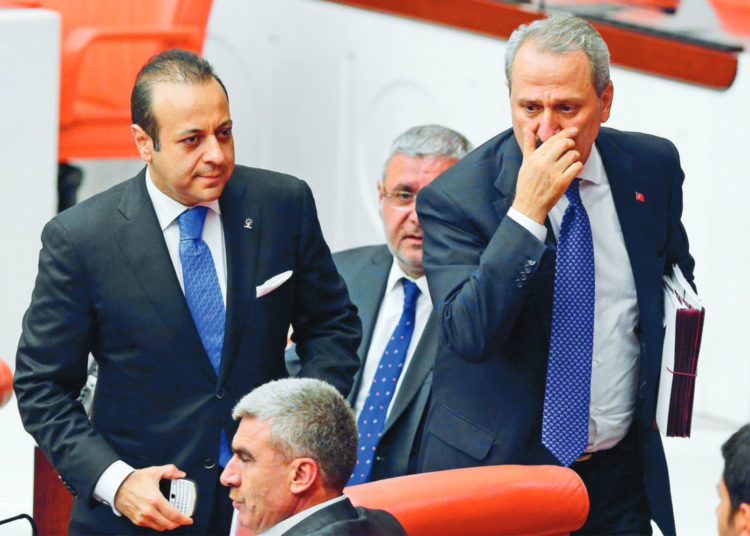Abdullah Bozkurt
Turgay Ciner, the owner of Turkey’s pro-government Ciner media group, which includes the HaberTürk daily and television station, worked closely with US-indicted Turkish Minister Zafer Çağlayan, who helped Iran evade financial sanctions, a secret document has revealed.
According to the document, which features the transcript of a wiretap recorded on September 19, 2013, Çağlayan asked a favor of Ciner for a young relative who had applied for a position in one of Ciner’s companies. In response, Ciner assured the minister that her recruitment would go through with no problems.
Ciner has business interests in various sectors, from mining to banking, and uses his media outlets to promote the government of President Recep Tayyip Erdoğan. In return he receives favorable treatment in government contracts, licensing and tenders. The wiretap was authorized by an Istanbul court on July 26, 2013 as part of an investigation into an organized crime network that incriminated Ciner and other Turkish businesspeople as well senior government officials.
Çağlayan told Ciner on the phone that a cousin from his aunt’s side, fresh out of university, had applied for a job in Ciner’s energy company and that he wants her to be hired by Ciner. In response Ciner said the matter was already handled and that she would start working for his company. Apparently pleased with the positive response, the Turkish minister asked Ciner if he needed anything from him as well. The two sounded very chummy on the phone as Zafer called Ciner “my dear” while Ciner called the minister “my Zafer.”
The wiretap transcript of Turgay Ciner’s phone conversation with US-indicted Turkish Minister Zafer Çağlayan:
Çağlayan was indicted in Turkey on charges of corruption, bribery and abuse of authority in December 2013 when he was found to be helping Iranian operatives move funds illegally out of Turkey, but Erdoğan, who was also incriminated in a similar probe, crushed the investigation and helped him and other suspects go free. The overwhelming evidence in the case file exposed how Çağlayan took bribes in cash and jewelry worth tens of millions of dollars.
Iranian-Turkish national Reza Zarrab, the lead suspect in the Turkish case, had paid Çağlayan a total of $52 million in bribes for schemes to bypass US sanctions using a Turkish state bank. Çağlayan also received TL 105 million ($50.5 million at the time) in bribes from Zarrab in return for having bureaucrats in his ministry aid the criminal organization in its unlawful business dealings, including the gold trade. A plane flying from Ghana to Iran landed in İstanbul on January 1, 2013, declaring that it carried 1,500 kilograms of “mineral samples.” However, upon inspection, customs officers found the plane had 1,208 kilograms of gold along with 250 kilograms of unidentified minerals as cargo. The plane was allowed to resume its flight after Çağlayan’s intervention.

US federal prosecutors indicted Çağlayan in September 2017 for “conspiring to use the US financial system to conduct hundreds of millions of dollars’ worth of transactions on behalf of the government of Iran and other Iranian entities.” The US indictment resembled the Turkish one, which exposed how Çağlayan and other government officials helped Iran evade sanctions by purchasing gold and conducting fictitious trade with oil and gas revenues. The corruption network was approved by Erdoğan, who had himself taken cuts from commissioning the use of Turkish state banks to bypass US sanctions on Iran. Çağlayan has remained at large in Turkey since then and has never stood trial in US federal court.
Zarrab was first arrested in Miami by the FBI and later charged with multiple accounts of violating US law. He subsequently turned government witness and testified against Çağlayan and the Turkish government, revealing how he had had many ministers on his payroll.
Ciner, who was also investigated in a December 25, 2013 investigation in Turkey, was gotten off the hook thanks to relations he had forged with Erdoğan. Mehmet Fatih Saraç, an executive at the Habertürk daily and Habertürk TV at the time, acted as a go-between, passing messages between his boss Ciner and Erdoğan and other government officials. Saraç made headlines in Turkey in February 2014 when a phone call between him and then-Prime Minister Erdoğan was leaked on the Internet, revealing that Erdoğan had instructed Saraç to censor the broadcasts of opposition leaders.













